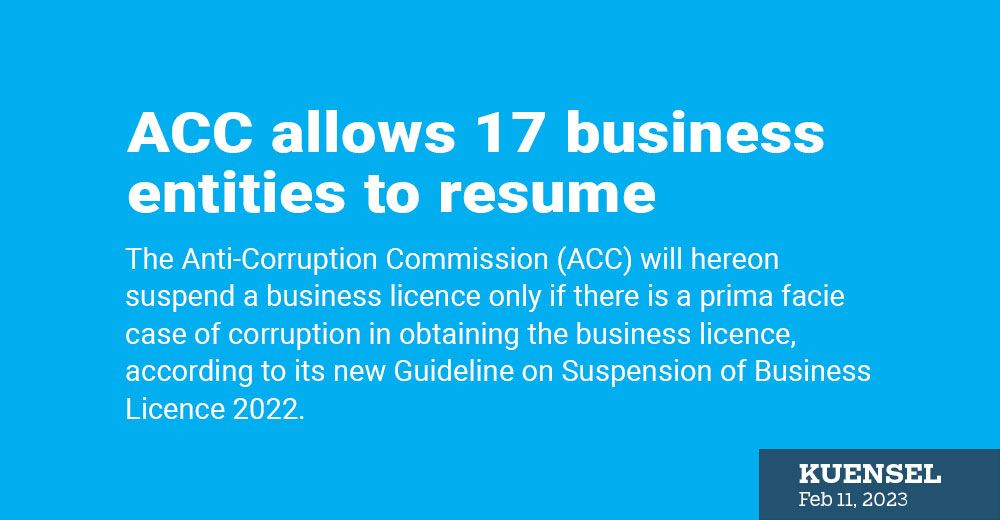… as per its new guideline
Rinzin Wangchuk
The Anti-Corruption Commission (ACC) will hereon suspend a business licence only if there is a prima facie case of corruption in obtaining the business licence, according to its new Guideline on Suspension of Business Licence 2022.
However, an individual or entity found to have committed a corruption offence by using a lawfully-obtained licence will be prohibited from drawing up contracts with public agencies until the conclusion of the case to prevent the corruption from perpetuating in public service.
The new guideline also stated that a business licence may not be suspended or an individual or entity may not be prohibited from entering into contractual relationships with public agencies if the prohibition would have an adverse impact on the national security and sovereignty, public health, or other public interest deemed relevant by the Commission.
Following the endorsement of the new guideline, ACC amended the previous suspension orders issued against more than a dozen business entities and allowed them to operate their businesses as usual from this week. However, they are still prohibited to enter into a contractual relationship with public agencies, according to ACC officials.
Currently, there are 17 business entities suspended on the ground of corruption charges including bribery of public servants, tax evasion, and aiding and abetting of perpetrators to commit crimes. These business entities are based in Phuentsholing, Thimphu, Dagana, Sarpang, Paro, Chukha and Trashiyangtse.
According to Kuensel sources, these business entities came under ACC’s radar after unearthing a racket of collusion among customs officials, importers, and loaders while importing goods through the Mini Dry Port (MDP) and other designated areas in Phuentsholing.
ACC’s investigation revealed that a senior customs inspector stationed at the MDP and truck parking (temporary) port in Phuentsholing had been receiving illicit payments from multiple parties in relation to the import of goods.
Empowered by Section 24 of the Anti-Corruption Act of Bhutan (ACAB) 2011, the commission last year suspended 14 business licences, excluding three business entities that were prohibited to deal business with public agencies recently, upon finding a prima facie case of corruption.
The section 24 of ACAB provides for ACC to either consider suspending the licence that is prohibiting any future business from using the suspended licence or prohibiting the licencee from entering into contractual relationship with public agencies but allowing the use of impugned licence for other private businesses.
Revision of guidelines?
Since the ACAB did not specify the manner in which Section 24 is to be invoked and enforced, ACC officials said that the Guideline on Suspension and Revocation 2016 was introduced to bring clarity to the suspension of business licences and ensure consistent application and enforcement with all business operations or activities being suspended during the investigation.
ACC Commissioner Jamtsho said, “However, experience over the years found that there was the need to be more specific and the effective implementation of the guidelines remained a challenge.”
The commission then revised the Guideline on Suspension and Revocation 2016 and adopted the Guideline on Suspension of Business Licence 2022 with the specific objective to prevent corruption from becoming pervasive and perpetuating in public service, as provided under the ACAB.
The Guideline 2022 sets out the specific conditions, manner, and application of suspension of business licences and prohibition of individuals or entities from entering into contractual relationship with public agencies.
Commissioner Jamtsho said that ACC has been reviewing its business processes: learning and gaining from experience and feedback to ensure that the agency remains responsive to the dynamic context and is able to not only meet the needs of the hour but also optimise the opportunities provided by the transformation process to take the anti-corruption agenda forward.
In this process, according to ACC, new rules, such as the Integrity Vetting (IVR) Rules 2022 and Public Service Model Code of Conduct (PSMCC) have been found necessary and existing ones are systematically being revisited and changes effected thereto. Amongst the various documents reviewed and amended is the Guideline on Suspension and Revocation 2016.
Meanwhile, the ACC is reviewing its Gift Rule 2017 based on experience and feedback received over the years.


